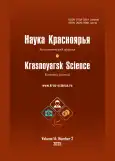Public administration in the field of countering child terrorism: A risk-based approach
- Authors: Polyanina A.K.1,2
-
Affiliations:
- Lobachevsky University
- Volga State University of Railway Transport
- Issue: Vol 14, No 2 (2025)
- Pages: 65-79
- Section: Articles
- Published: 30.06.2025
- URL: https://journal-vniispk.ru/2070-7568/article/view/304202
- DOI: https://doi.org/10.12731/2070-7568-2025-14-2-292
- EDN: https://elibrary.ru/XKMWZK
- ID: 304202
Cite item
Full Text
Abstract
The leap in the development of information technology has led to an unprecedented increase in the opportunities for children to be involved in criminal communities and terrorist activities. The process of recruiting minors to carry out terrorist acts appears to be a sequence of actualization of certain risk factors. The social effectiveness of public administration in the field of countering terrorism can be considered as an indicator of the well-being of the population. The analysis of public administration processes in this case requires a holistic approach based on taking into account all the factors that facilitate or ensure the recruitment of children by terrorists. The possibility of involving children in terrorist activities is considered as a risk that is the object of public administration, or more precisely, minimization. Based on the author's concept, a risk-based approach is proposed to explore the possibilities of state risk management for involving children in criminal activities, as well as a classification of risk behavior factors.
Purpose. The search for ways to increase the social effectiveness of public administration in the field of countering terrorism through the development of a risk-based approach to managing the risks of involving children in terrorist activities.
Methodology: abstract logic was used as the main method, statistical analysis methods were also used.
Results: theoretical approaches to the risk management methodology of involving children in terrorist activities have been developed, and the main vectors of managerial influence have been formulated.
Practical implications. The results obtained can be used by the government in assessing the risks of terrorism, forecasting and preventing risks.
About the authors
Alla K. Polyanina
Lobachevsky University; Volga State University of Railway Transport
Author for correspondence.
Email: Alker@yandex.ru
ORCID iD: 0000-0003-2035-9849
SPIN-code: 4324-4300
Professor of the Department of Management and Public Administration, Doctor of Sociological Sciences; Associate Professor
Russian Federation, 23, Gagarin Str., Nizhny Novgorod, Nizhny Novgorod region, 603087, Russian Federation; 3, Komsomolskaya Square, Nizhny Novgorod, Nizhny Novgorod region, 603087, Russian Federation
References
- Avdashkin, A. A., Bredikhin, S. S., & Gafner, N. A. (2023). Information Warfare in Digital Media Space. Chelyabinsk: South Ural State University. 364 p. ISBN: 978-5-696-05415-5 EDN: https://elibrary.ru/KDKULD
- Baudrillard, J. (2016). The Spirit of Terrorism. There Was No Gulf War. Moscow: RIPOL Classic. 222 p.
- Budanov, V. G. (2021). Possibility of integral ethics of the great anthropological transition. Izvestia of Southwest State University. Series: Economics. Sociology. Management, (6), 260–269. https://doi.org/10.21869/2223-1552-2021-11-6-260-269 EDN: https://elibrary.ru/EZILNX
- Voronin, V. N. (2024). The notion of "criminal legal risk" in sociology of criminal law: theoretical reasoning. Bulletin of Kutafin Moscow State Law University, (4), 188–200. https://doi.org/10.17803/2311-5998.2024.116.4.188-200 EDN: https://elibrary.ru/HRTCMC
- Zubkov, V. I. (2003). Sociological Risk Theory. Moscow: RUDN University Publishing House. 230 p. ISBN: 5-209-01567-X EDN: https://elibrary.ru/QOCDSB
- Karpunkina, T. N., & Alafirovskaya, N. V. (2005). Sociotherapeutic space in education. Tomsk State University Bulletin, (286), 76–83. EDN: https://elibrary.ru/KCLEST
- Popova, T. A. (2021). Existential component of teenager's self-concept: theory and research practice. In Psychology of Meaningful Living: Viktor E. Chudnovsky's School (2nd ed., pp. 473–488). Moscow: Sense.
- Frankl, V. (1990). Man's Search for Meaning. Moscow: Progress. 368 p. ISBN: 5-01-001606-0 EDN: https://elibrary.ru/YQCMMA
- Khoruzhy, S. S. (2016). Society and Synergy: Colonization of Interface. Kazan: Kazan Innovative University named after V. G. Timiryasov (IEPU). 452 p.
- Shapovalov, V. F. (2010). Communication as a global challenge of the modern world. Philosophy and Society, (4), 5–20. EDN: https://elibrary.ru/NCSMDV
- Shlykova, Yu. B. (2009). Subjective picture of the life path of adolescents. In Psychology of Man in the Modern World: In 6 vols. Proceedings of the All-Russian anniversary scientific conference dedicated to the 120th anniversary of the birth of S. L. Rubinstein (October 15–16, 2009, Moscow) (vol. 1, pp. 326–333). Moscow: Institute of Psychology of the Russian Academy of Sciences.
- Erikson, E. H. (2006). Identity: Youth and Crisis. Moscow: Flinta. 341 p. ISBN: 5-89349-860-7 EDN: https://elibrary.ru/QXPMCL
- Baisagatova, D. B., Smagulova, D. A., Kozhamberdiyeva, A. S., & Kemelbekov, S. T. (2016). Correlation of concepts "extremism" and "terrorism" in combating the financing of terrorism and extremism. International Journal of Environmental and Science Education, (13), 5903–5915. EDN: https://elibrary.ru/XLGYTV
- Balgimbekova, G., Zhamiyeva, R., & Serikbayev, A. (2021). International legal aspects of countering environmental terrorism in the context of modern trends in radical environmentalism. International Environmental Agreements: Politics, Law and Economics. https://doi.org/10.1007/s10784-021-09556-1 EDN: https://elibrary.ru/RKFVAN
- Borichev, K., Radchenko, T. V., Moiseeva, A., & Chasovnikova, O. (2022). Countering international terrorism: Problems of criminal-law qualification. Journal of Law and Sustainable Development, (1), 0224. https://doi.org/10.37497/sdgs.v10i1.224 EDN: https://elibrary.ru/HEOJJQ
- Luhmann, N. (1993). Risk: A Sociological Theory. New York: Walter de Gruyter, Inc. 236 p.
- Munger, M. (2006). Preference modification versus incentive manipulation as tools of terrorist recruitment: The role of culture. Public Choice, (1), 131–146. https://doi.org/10.1007/s11127-006-9048-6 EDN: https://elibrary.ru/SBGAJQ
- Sherrieb, K. (2013). Public health consequences of terrorism on maternal-child health in New York City and Madrid. Journal of Urban Health, (3), 369–387. https://doi.org/10.1007/s11524-012-9769-4 EDN: https://elibrary.ru/JTHTBY
- Zinn, J. O. (2023). Risk-taking and social inequality. Journal of Sociology, 60(3), 144078332311628. https://doi.org/10.1177/14407833231162865 EDN: https://elibrary.ru/GFTJMU
Supplementary files










